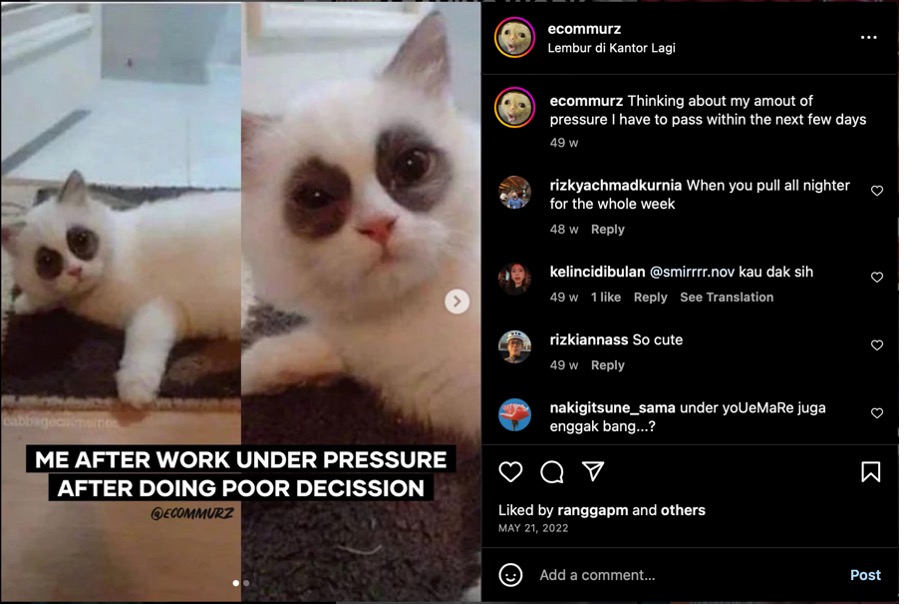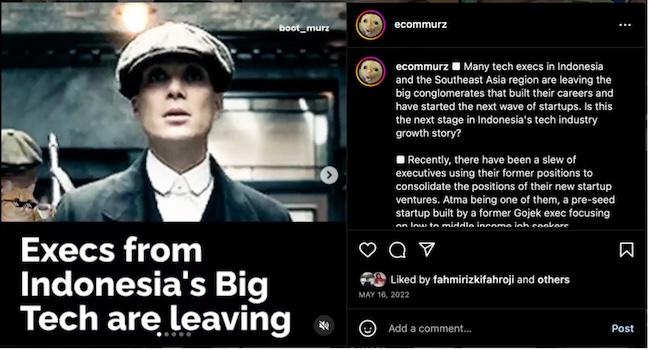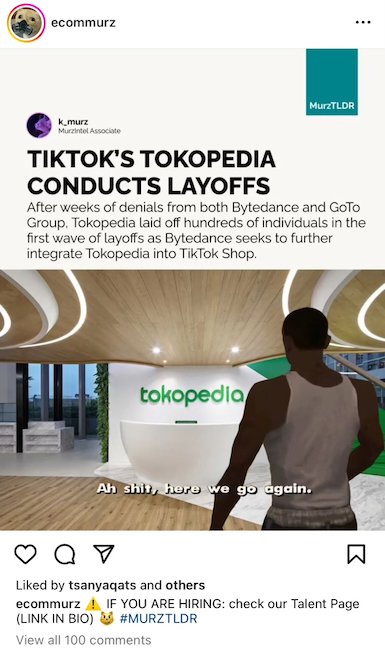Beyond the hype, workers in this booming industry are seeking not only comic relief, but real improvements in their conditions. An Instagram account is helping with both.
Ibnu Nadzir
Whilst researching the Indonesian startup ecosystem, I noticed that a particular social media account often came up. The account was Ecommurz, an Instagram presence that describes itself as an ‘Ecommerce and Tech Meme Factory’ and ‘Indo Biggest Tech Execs & Workers Community’. Despite its casual and humorous outlook, Ecommurz might just be the key for workers (and others) to navigate the intricacies of working culture within Indonesian startups.
It has been over a decade since Gojek, the poster child of Indonesian technological startups, first began. Startup, in its original usage, refers to any entrepreneurial venture in its early stage. In Indonesia, the term usually denotes companies whose business models are based on digital technologies. Startups can range from apps offering transportation and educational services to online lending platforms. Indonesia is home to the 6th most startups in the world. By the end of 2025, the value of Indonesia's digital economy is expected to reach $US130 billion.
Beyond the hype, however, the industry is an unpredictable ecosystem. On the one hand, many startup workers earn over five times the minimum income in Jakarta. This is the result of a competitive employment market that peaked during the COVID-19 period, alongside increasing investments in digital businesses. On the other hand, many volatilities put these workers in a precarious situation. Not long after the pandemic, a decrease in foreign investment led to what many call the ‘tech winter’ and sudden layoffs. Amidst this precarity, Ecommurz emerged and gained popularity. By January 2024, the account had hundreds of thousands of followers.
Working culture
At first glance, the Ecommurz account looks random and unstructured. Its posts draw on many references, ranging from popular culture materials such as Marvel superheroes to clips of a man being tickled. Posts combine engaging pictures and animations with captions written in (sometimes idiosyncratic) English. They do not necessarily have a single, coherent ‘meaning’ but generate a cluster of feelings and associations. This increases their relatability, as different viewers can connect with different aspects of each meme. What they all have in common is their focus on the labour conditions experienced by startup workers in Indonesia, a topic Ecommurz generally addresses via humorous graphics with a sarcastic or self-pitying tone.


The post above was published just as the Eid holiday ended alongside the caption ‘Monday vibes’. The post contained two videos, with text added by Ecommurz, which suggested that the tasks given to employees will be overwhelming after a long break. The first video shows a young man being held down by multiple people and yelling loudly as other men tickle his body. Ecommurz added the text in the video, ‘How I defend tomorrow's chaos’. To me, the clip indicates how, despite trying to anticipate the tasks after the holiday, startup workers will most likely be helpless, just like the guy overwhelmed by the tickle.
The second clip shows a person in a raft struggling to maintain balance against the strong river currents. On top of that, the account has added the text, ‘Me trying to run fast on tomorrow chaotic’. I presume the meme creator imagined the first day back at work to be disorganised, hence the urge to run away from responsibilities. This effort is also seen to be futile, just as it is for the figure on the raft, carried away by the river’s rapid currents.
In themselves, the clips do not speak for the specific experiences of people working at startups. The intended meaning is framed within Ecommurz’s position as a hub for startup workers. For those working as professionals at Indonesian startups the sense of their work being unstructured and even chaotic is quite common, particularly in comparison with established industries.
Just a cat?
Cats are one of the most popular source materials for Internet memes. Ecommurz also uses them, adopting a cat as the symbol of the account and often referring to itself as ‘merely a cat’. Ecommurz usually uses this phrase after the account divulges information about a startup. In a recent case, Ecommurz commented on the government’s position regarding foreign technological companies. When a follower of the account complained about the regulations, the account replied, ‘I am just a cat’. The account actively downplays its influence among technological companies and reminds its followers that it is still only a meme account page.

The meme above depicts a cat with a distinct black pattern around its eyes. Text has been added to the picture, saying ‘me after work under pressure after doing poor decision’, while the caption says ‘thinking about the amount (sic) of pressure I have to pass within the next few days’. These captions are accompanied by the location column where Ecommurz writes, ‘overtime at the office again’. The picture connects the black circle around the cat’s eyes with the ways workers’ eyes darken from lack of sleep after pulling all-nighters for overtime. In this regard, the cat offers humorous relief from what is usually considered a miserable situation. The adorable nature of these images contrasts with the stressful working culture that startup employees experience.
A source of information
Besides the humorous content, Ecommurz shares information about the Indonesian startup ecosystem; about the possible acquisition of one comany by another; possible plans for layoffs within specific startups; even the issue of a company’s misconduct by not paying its employees. Some of my interlocutors suggested they can sometimes get information about their workplace faster through the account than through formal channels. Humour is minimal within this kind of content, and posts focus on raising discussion around important topics. Such posts typically involve infographics, graphs, or screenshots from news outlets, but they can also involve more creative forms of meme imagery.

The figure used in this meme is a short clip of Thomas Shelby, a fictional gang leader from Birmingham in the television series Peaky Blinders, walking in an aisle. In the show, Shelby is portrayed as an influential figure who makes various moves to expand the influence of his gang. The symbolism is relevant to an Ecommurz post based on articles published on Ken and Tech in Asia, two exclusive news platforms focused on the development of startups in Asia. The articles highlight the role of the two Southeast Asian technological giants, Gojek and Grab, in producing ex-employees who have either became the executives or the founders of many other startups in the region. The fact that only two companies produce so many dominant figures in the startup ecosystem has made the articles compare it with mafia networks – hence the relevance of Peaky Blinders imagery.
In comparison with other memes, this post has very few humorous elements. The picture of Thomas Shelby has a serious tone, which is strengthened by its captions. This somewhat different tone is even addressed in the commentary section, where one of their followers commented, ‘I thought I was reading [the technology news website] Asiatech, apparently it is Murz (surprised emoji)’.
Organising beyond humour
While initially started as a meme account, Ecommurz has grown to be much more than an account that provides comic relief. Some of its followers use the information it provides to navigate even the most personal aspects of their working lives. In one of the Instagram ‘Highlights’ entitled ‘Mental Support’, Ecommurz shares the stories of a follower who was looking for a suicide hotline. The anonymous follower reached out to Ecommurz via direct messages on Instagram. The follower had felt a psychological burden due to being laid off from his company while needing to meet various financial responsibilities. The account connected him with professional help, updated the story, and encouraged others to open up about their psychological situation. The original story prompted other followers to share their own stories while praising the active role of Ecommurz in handling the issue.

On many other occasions, the account has received ‘leaks’ from startup workers about problematic working cultures in their companies. There are stories are about incompetent leaders, lack of overtime compensation, and the exploitation of interns. Often the companies mentioned by Ecommurz in such posts will issue an official response to the claims. In one high-profile case, a giant educational startup accused of exploiting interns issued an official statement that promised to improve their system. Given the lack of proper workers’ organisations and limited accountability of many Indonesian startups, Ecommurz serves as a platform which, despite its limited capabilities, can influence the Indonesian startup ecosystem. As the Chief Technological Officer at an agricultural startup commented, ‘Sometimes, I also reflect on whether I am [one] of the (startup) bosses depicted in these posts’. Ecommurz memes can thus to some extent, spur some startup executives to produce a better corporate culture.
The extent to which Ecommurz and similar accounts can produce significant changes remains unclear. After all, meme consumption is mostly transient and limited to the immediacy of social media. It also should not be the task of meme accounts to bring a healthy working culture to Indonesian startups. This responsibility should lie with key actors in the industry, startups themselves, venture capitalists, and the government officials who preach an idealised future of an Indonesia driven by the digital economy.
Ibnu Nadzir (ibnu.daraini.21@ucl.ac.uk) is a PhD student from UCL (University College London), Anthropology Department, working on his thesis on the sociality of the startup ecosystem in Indonesia.











